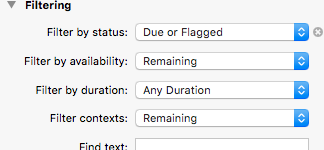[quote=“vs_anderson, post:48, topic:33386, full:true”]
. . . . Extend the concept, and where does it end? You potentially wind up having a “Pre Do Date”, and then a “Pre Pre Do Date”, etc.[/quote]
No need for “Pre Do Date” etc extension of concept.
The concept begins and ends with the notion that “Do” and “Due” have different meanings.
It isn’t about getting advance warning of a Due item per se, it is about capturing (and at appropriate later date being reminded) of what work was planned for a given day.
What WOULD be useful is an option for Forecast view to show Action Items on their “Do Date” (with, or without “Due, Due Soon, Past Due”, at user’s preference).
Due Soon doesn’t help, for a couple reasons. First, it relies on “Due Date” which can be unrelated to when the work to complete an item must be performed (either because the item has no formal Due Date, or appropriate Context will be available only on some earlier date).
Secondly, Due Soon is a short horizon (couple days) before a Due Date. Something Due at the end of the month that requires Doing this week (because appropriate Context is avail then, but not later) would not appear on Due Soon list until too late.
Reviewing a “Due Soon” list of a longer (say, 30 day) horizon would allow you to surface items sooner, but the list would be too long, and more to the point it is pushing a review process into every daily review that might already have been considered in an earlier daily or weekly review (but not captured by OmniFocus).
One benefit of introducing a “Do Date” is that it removes the incentive to “lie” about Due Dates (ie., entering a Due Date on an item that really doesn’t have one, or putting an earlier Due Date on an item to force it to appear on Due Soon). Keeping the terminology “pure” helps Mind-Like-Water focus (because you can avoid the concern of “is this a ‘real’ Due Date or one i set to prompt me” and you don’t need to think about “correcting” the Due Date of a recurring item that you set earlier this time but want to be at normal date next month).
The notion is to capture information when it occurs to the user (in this case, during periodic review), and surface it again when appropriate (the day has arrived). Currently OmniFocus has no ability to capture this info.
Another benefit would be the ability for OmniFocus to show you when you are over-extended. If the user (consistently) enters Duration data, the (previously mentioned enhanced) Forecast view could indicate total time committed on each day.
(I’m not sure if Duration is a data element in OmniFocus. just looked for it and see “Estimated Time”, which I guess is what I was thinking about.).

